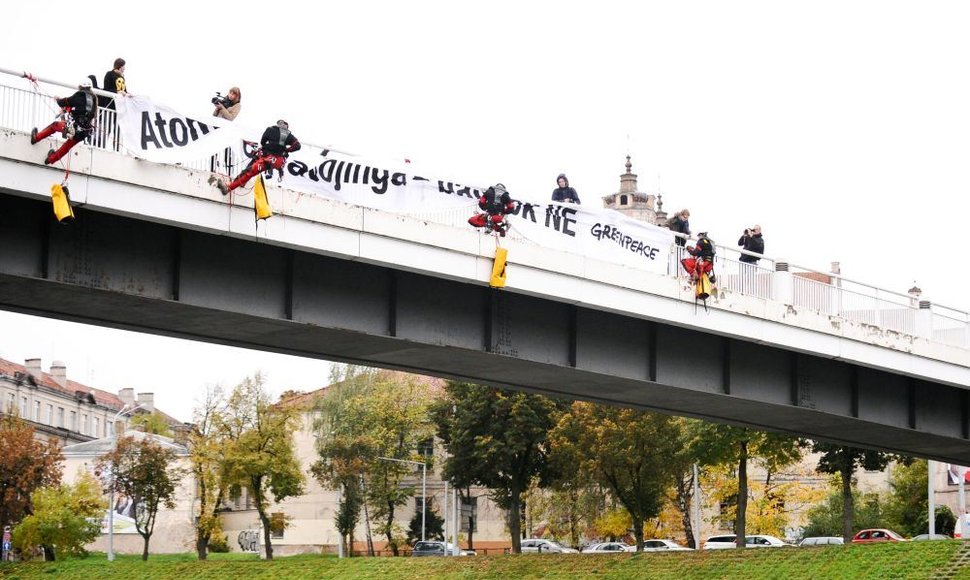Wednesday morning, Greenpeace volunteers put a banner on the White Bridge in Vilnius, with four climbers hanging on ropes underneath, reading "Nuclear plant is dangerous - vote NO" in Lithuanian.
"There is no such thing as safe nuclear power," said Greenpeace activist Andrea Zlatnanska. "They've been telling us for the last sixty years that nuclear power is safe, but history begs to differ. Lobbyist of the industry keep insisting that a catastrophe is impossible – the same thing that they said before Chernobyl, before Fukushima, but disasters do happen around the world. Lithuania cannot afford to be one more "impossible" catastrophe."
She notes that even countries that have decided to give up nuclear energy and pursue safe alternatives still have not solved the problem of how to dispose of spent nuclear fuel. Nuclear waste means risks and expenditure for millennia to come, she says. Greenpeace urges Lithuania to learn from other countries' mistakes and instead jump on the bandwagon of increasing efficiency and developing green energy sources that will help achieve true energy independence and create many green jobs.
"Saying that building a nuclear power plant is your ticket to the West is nonsense. There's no "western" nuclear energy any more. Many western countries are turning away from this dangerous technology, starting with Germany, Belgium, Switzerland, even France. Catastrophe-struck Japan, too, is changing its energy policy. Even if you build a new nuclear plant, you will still be dependent on foreign suppliers, there's no such thing as independent nuclear power plant," Zlatnanska said.
The international community is concerned about the reactors that Japanese company Hitachi-GE is planning to build in Lithuania. Greenpeace notes that the same companies built reactors in Fukushima. When the plant was struck by a tsunami wave, the situation was made worse by technological flaws that the companies knew about but still failed to fix for decades, as revealed by an investigation carried out by the Japanese Government.
"The [Lithuanian] Government avoids any criticism of nuclear energy, while the President's instructions to comprehensively inform the public were turned into emotional propaganda. With the help of the State Security Department, any disagreement with the Government's energy policy is equated to high treason. Public funds are used to finance a campaign that presents only one side of the Visaginas Nuclear Power Plant project. It is not a transparent and civilized way to discuss issues of such scale and importance. It only undermines the civil society and Lithuania's credibility as a democratic country," says Kęstutis Navickas, chairman of the Environment Coalition.
Prime Minister rejects criticism
Lithuanian Prime Minister Andrius Kubilius rejected Greenpeace criticism over the nuclear power plant, noting that the organization was also against the construction of Būtingė oil terminal in the late 1990s which gained strategic importance in supplying crude to the refinery in Mažeikiai after Russia cut oil supply.
Commenting on Greenpeace actions in Vilnius, Kubilius expressed doubt whether this organizations was consistent in its ideology.
"They protested against the construction of Būtingė terminal, despite the fact that the strategic goal of having such a terminal has served its purpose. Lithuania did the right thing by building it even amid Greenpeace protests. After supplies via the only pipeline going to Russia, as you know, stopped, the terminal fully served its purpose," Kubilius said.
Lithuania has been using tankers to supply crude to Mažeikiai refinery since 2006 when Russia cut supplies via Druzhba pipeline.
The prime minister also believes that "people of Lithuania have their own opinion."
"I would like to draw attention to the fact that, as analysts and the press have noted, Greenpeace has sometimes deviated from its ideas, ideaologies, sometimes even in terms of its financial sources," Kubilius said, refraining from elaborating further.


















